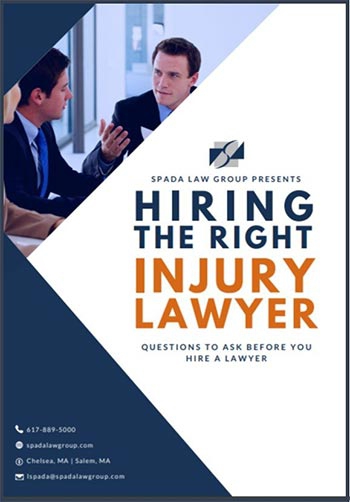It's a Very Relatable Experience
Playing organized sports was such a huge part of our youth for many of us. I reminisce fondly of playing youth and high school hockey as a kid growing up in East Boston. We were so passionate about hockey and it was a great way for us to stay focused, in shape and out of trouble (at least most of the time). But hockey is and always has been a contact sport and injuries happen. I remember my Mom coming to her one and only game to see me play in high school. I got a stick in the face, cut open my chin and bled all over the ice. She never came back to watch another game! Injuries are just an inevitable part of playing sports and oftentimes those injuries are caused by the actions of an opposing player and sometimes those actions amount to a violation of the rules of the game. But are they (or should they be) actions that could give rise to a lawsuit? Well that exact issue was recently addressed by our courts here in Massachusetts on December 2, 2019.
In the case of Borella v. Renfro the Massachusetts Appeals Court addressed this question in the context of a hockey game and their decision and rationale gives guidance as to how other, future cases may be decided.
The Facts
In Borella, two select hockey teams consisting of boys between the ages of 17-19 were playing each other in The Boston Selects 2013 AAA Tournament of Champions. The game was a physical and hard-fought battle that eventually became a lopsided blow out. By the end of the third period the score was 8 to 3 and the game was getting quite chippy. In total the referees assessed eight penalties during the game. With less than two minutes remaining in the third period, Julian Lever (Lever) skated toward Daniel Borella at a very high rate of speed and checked him into the boards in what was described as a "smash" and "a tremendous hit". Borella was knocked temporarily unconscious and and in the ensuing battle for the puck while Borella was down on the ice, Lever inadvertently skated over Borella’s hand. The resulting cut to Borella’s hand caused Borella to permanently lose partial use of his dominant hand. Lever received a minor penalty for Boarding as a result of the check. Borella filed a lawsuit against Lever, the referees, the coaching staff and the owners of the rink.
What did Borella Sue for?
In his lawsuit, Borella alleged the following against each of the defendants:
- Lever-Borella claimed that Lever was negligent or in the alternative, committed a battery against him. A battery is the legal term for intending to cause a harmful or offensive contact.
- Referees-Borella claimed that the referees were negligent because they failed to control the game and should've ended the game prior to him being injured.
- Coaching Staff- the coaches were allegedly negligent for failing to protect the players on the ice from injury.
- Owners of the rink-the owners were negligent for failing to maintain a safe environment and for being negligent in their hiring and supervision of the referees.
How did the Court Decide the Case?
This case never even got to the trial stage. Borella lost the case on what is called “Summary Judgement”. This means that the trial level judge, after viewing the evidence in the most favorable light to Borella, decided that there were no material facts in dispute and that as “a matter of law” Borella could not succeed and therefore the case must be dismissed. Summary Judgement is designed to prevent cases with no legal merit from taking up the court’s limited resources. When a trial judge makes a ruling on Summary Judgement, the losing party, here Borella, has the right to appeal, which Borella did. In this case, the Appeals Court agreed with the trial judge and affirmed his decision.
So, What is the Law? When (if ever) Can Someone Sue for an Injury They Sustained in a Sporting Competition?
The law in Massachusetts states that "participants in an athletic event owe a duty to other participants to refrain from reckless misconduct.” The courts have defined "reckless misconduct" as "intentional conduct involving a high degree of likelihood that substantial harm will result to another". The tough issue the court faced in Borella was that hard body checking in the game of ice hockey is an essential and permitted part of the game and clearly consist of intentional conduct “involving a high degree of likelihood that substantial harm will result to another”. Hockey is by its very nature, like football and other contact sports, a very dangerous activity when played the way it was intended to be played. So, the court had to fashion a rule that was workable for the case at hand while also providing guidance to future parties on the state of the law on this topic.
To do so, the court looked at how other state courts have decided similar issues. Other states have held that in contact sports, prohibited conduct is conduct which is “extreme misconduct outside the range of ordinary activity inherent in the sport”. Was a hard body check "outside" the "range" of "ordinary" activity "inherent" in the game of ice hockey? The court ruled, correctly I believe, that it was not prohibited conduct that should give rise to legal liability. A check that is impermissible, as the one Lever delivered, does not necessarily render it “outside the range” of ordinary activity inherent in the game of hockey. You may get a penalty if the check violates the rules of the game but that does not by itself rendered the check outside the range of ordinary activity. This type of analysis is very fact-specific and another case involving a hockey check could bring about a different result. For example, if a player delivers a hard body check to another player who is not involved in the play at all may be considered “extreme misconduct” that is actionable in our legal system. Or if a player intentionally swings a stick at a player’s head with an obvious intent to cause injury, that too would likely give rise to legal liability. The court in Borella made it clear that the appropriate application of this rule requires consideration of the nature of the sport itself.


